Business Environment Dynamics: A Case Study of TUI Group (2019-2022)
VerifiedAdded on 2023/06/10
|9
|2753
|500
Case Study
AI Summary
This case study report provides a comprehensive analysis of TUI Group's business environment between 2019 and 2022, focusing on the impacts of the COVID-19 pandemic and the UK government's tourism recovery plan. The report examines TUI Group's internal, micro, and macro environments, utilizing STEEPLE analysis to assess social, technological, economic, environmental, political, legal, and ethical factors. It highlights the challenges faced by the tourism industry during the pandemic, including reduced travel, hotel occupancy, and supply chain disruptions, and explores how the government's recovery plan, tax relaxations, and marketing campaigns aided TUI's recovery. The analysis also covers the competitive landscape, organizational structure, and leadership of TUI Group, providing insights into the company's strategies for navigating environmental uncertainties and improving its overall performance.
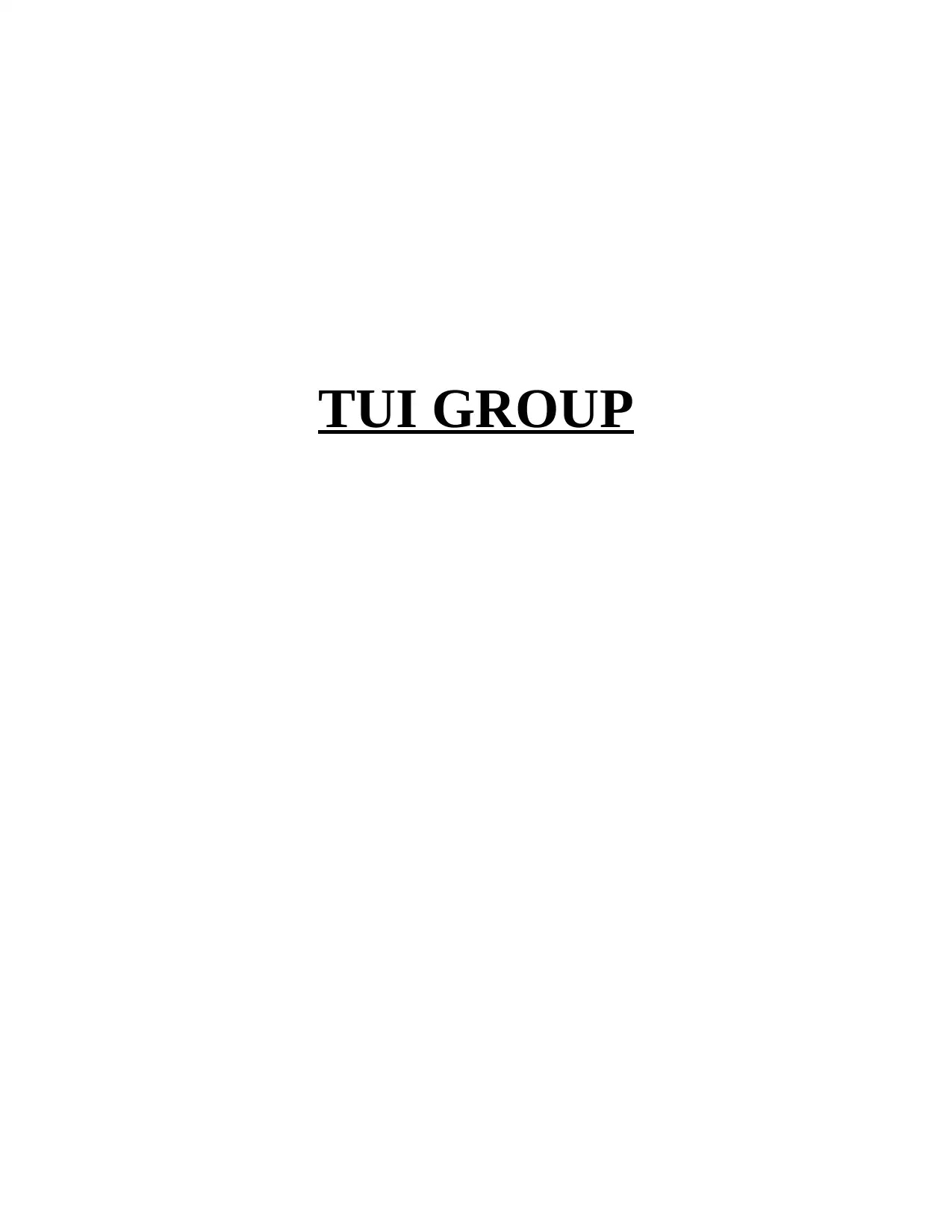
TUI GROUP
Paraphrase This Document
Need a fresh take? Get an instant paraphrase of this document with our AI Paraphraser
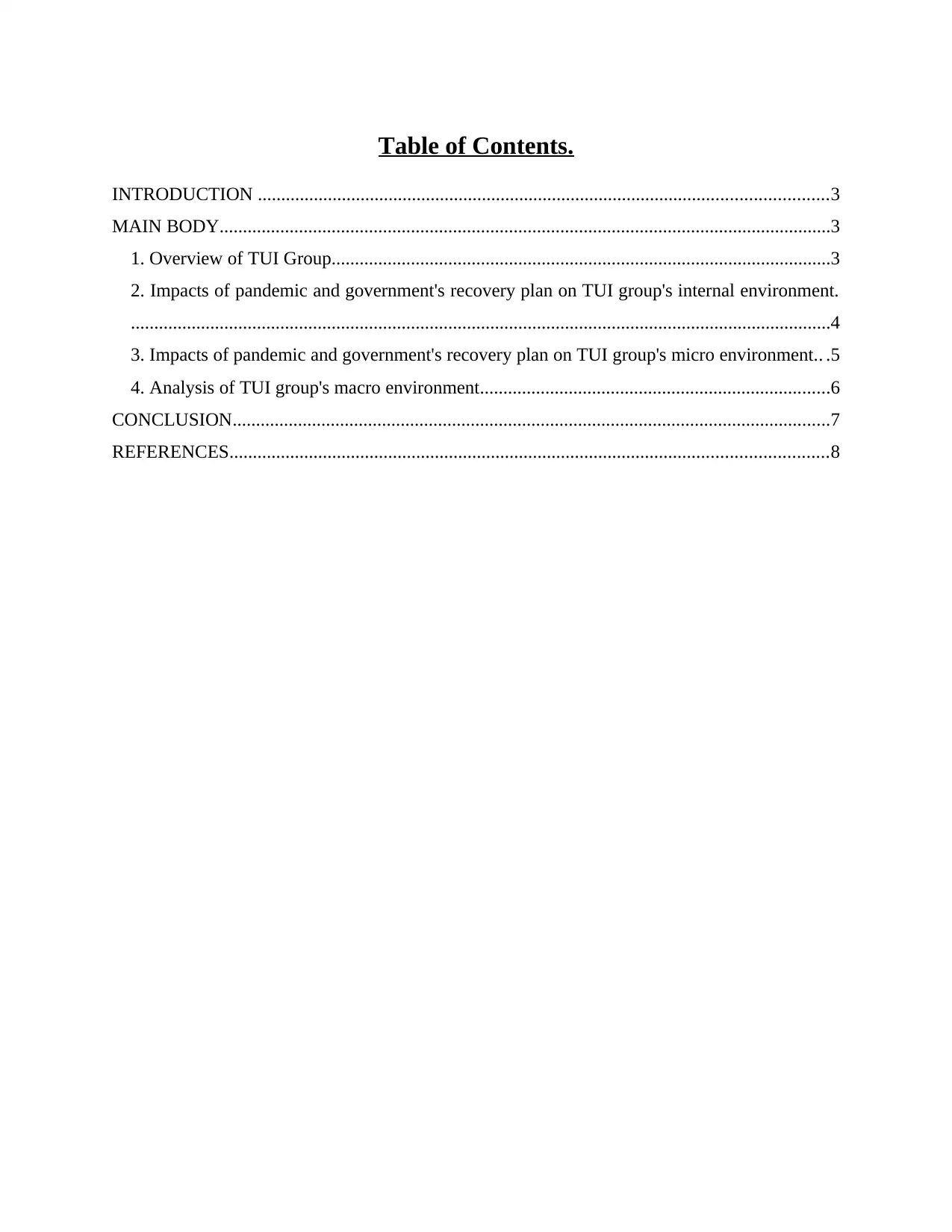
Table of Contents.
INTRODUCTION ..........................................................................................................................3
MAIN BODY...................................................................................................................................3
1. Overview of TUI Group...........................................................................................................3
2. Impacts of pandemic and government's recovery plan on TUI group's internal environment.
......................................................................................................................................................4
3. Impacts of pandemic and government's recovery plan on TUI group's micro environment.. .5
4. Analysis of TUI group's macro environment...........................................................................6
CONCLUSION................................................................................................................................7
REFERENCES................................................................................................................................8
INTRODUCTION ..........................................................................................................................3
MAIN BODY...................................................................................................................................3
1. Overview of TUI Group...........................................................................................................3
2. Impacts of pandemic and government's recovery plan on TUI group's internal environment.
......................................................................................................................................................4
3. Impacts of pandemic and government's recovery plan on TUI group's micro environment.. .5
4. Analysis of TUI group's macro environment...........................................................................6
CONCLUSION................................................................................................................................7
REFERENCES................................................................................................................................8
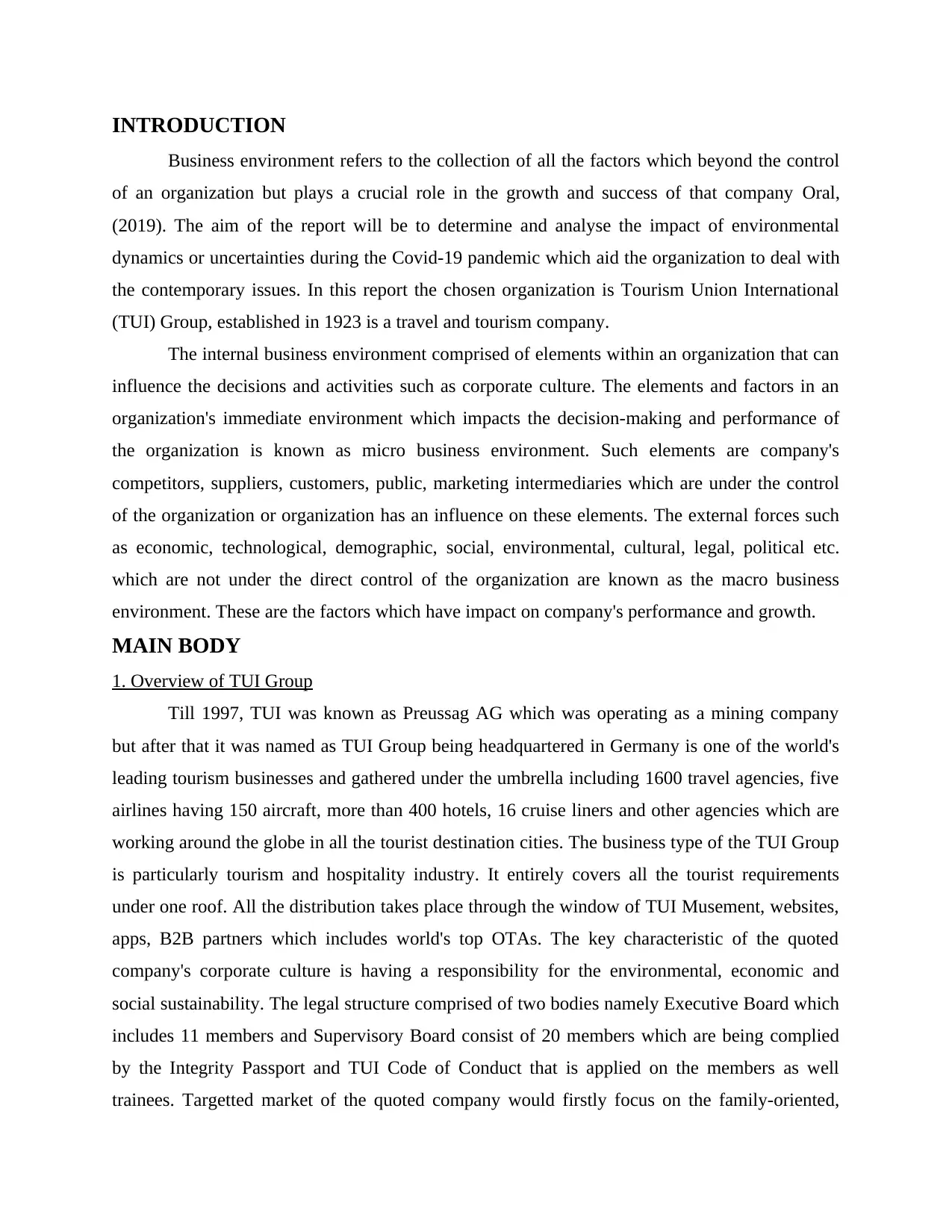
INTRODUCTION
Business environment refers to the collection of all the factors which beyond the control
of an organization but plays a crucial role in the growth and success of that company Oral,
(2019). The aim of the report will be to determine and analyse the impact of environmental
dynamics or uncertainties during the Covid-19 pandemic which aid the organization to deal with
the contemporary issues. In this report the chosen organization is Tourism Union International
(TUI) Group, established in 1923 is a travel and tourism company.
The internal business environment comprised of elements within an organization that can
influence the decisions and activities such as corporate culture. The elements and factors in an
organization's immediate environment which impacts the decision-making and performance of
the organization is known as micro business environment. Such elements are company's
competitors, suppliers, customers, public, marketing intermediaries which are under the control
of the organization or organization has an influence on these elements. The external forces such
as economic, technological, demographic, social, environmental, cultural, legal, political etc.
which are not under the direct control of the organization are known as the macro business
environment. These are the factors which have impact on company's performance and growth.
MAIN BODY
1. Overview of TUI Group
Till 1997, TUI was known as Preussag AG which was operating as a mining company
but after that it was named as TUI Group being headquartered in Germany is one of the world's
leading tourism businesses and gathered under the umbrella including 1600 travel agencies, five
airlines having 150 aircraft, more than 400 hotels, 16 cruise liners and other agencies which are
working around the globe in all the tourist destination cities. The business type of the TUI Group
is particularly tourism and hospitality industry. It entirely covers all the tourist requirements
under one roof. All the distribution takes place through the window of TUI Musement, websites,
apps, B2B partners which includes world's top OTAs. The key characteristic of the quoted
company's corporate culture is having a responsibility for the environmental, economic and
social sustainability. The legal structure comprised of two bodies namely Executive Board which
includes 11 members and Supervisory Board consist of 20 members which are being complied
by the Integrity Passport and TUI Code of Conduct that is applied on the members as well
trainees. Targetted market of the quoted company would firstly focus on the family-oriented,
Business environment refers to the collection of all the factors which beyond the control
of an organization but plays a crucial role in the growth and success of that company Oral,
(2019). The aim of the report will be to determine and analyse the impact of environmental
dynamics or uncertainties during the Covid-19 pandemic which aid the organization to deal with
the contemporary issues. In this report the chosen organization is Tourism Union International
(TUI) Group, established in 1923 is a travel and tourism company.
The internal business environment comprised of elements within an organization that can
influence the decisions and activities such as corporate culture. The elements and factors in an
organization's immediate environment which impacts the decision-making and performance of
the organization is known as micro business environment. Such elements are company's
competitors, suppliers, customers, public, marketing intermediaries which are under the control
of the organization or organization has an influence on these elements. The external forces such
as economic, technological, demographic, social, environmental, cultural, legal, political etc.
which are not under the direct control of the organization are known as the macro business
environment. These are the factors which have impact on company's performance and growth.
MAIN BODY
1. Overview of TUI Group
Till 1997, TUI was known as Preussag AG which was operating as a mining company
but after that it was named as TUI Group being headquartered in Germany is one of the world's
leading tourism businesses and gathered under the umbrella including 1600 travel agencies, five
airlines having 150 aircraft, more than 400 hotels, 16 cruise liners and other agencies which are
working around the globe in all the tourist destination cities. The business type of the TUI Group
is particularly tourism and hospitality industry. It entirely covers all the tourist requirements
under one roof. All the distribution takes place through the window of TUI Musement, websites,
apps, B2B partners which includes world's top OTAs. The key characteristic of the quoted
company's corporate culture is having a responsibility for the environmental, economic and
social sustainability. The legal structure comprised of two bodies namely Executive Board which
includes 11 members and Supervisory Board consist of 20 members which are being complied
by the Integrity Passport and TUI Code of Conduct that is applied on the members as well
trainees. Targetted market of the quoted company would firstly focus on the family-oriented,
⊘ This is a preview!⊘
Do you want full access?
Subscribe today to unlock all pages.

Trusted by 1+ million students worldwide
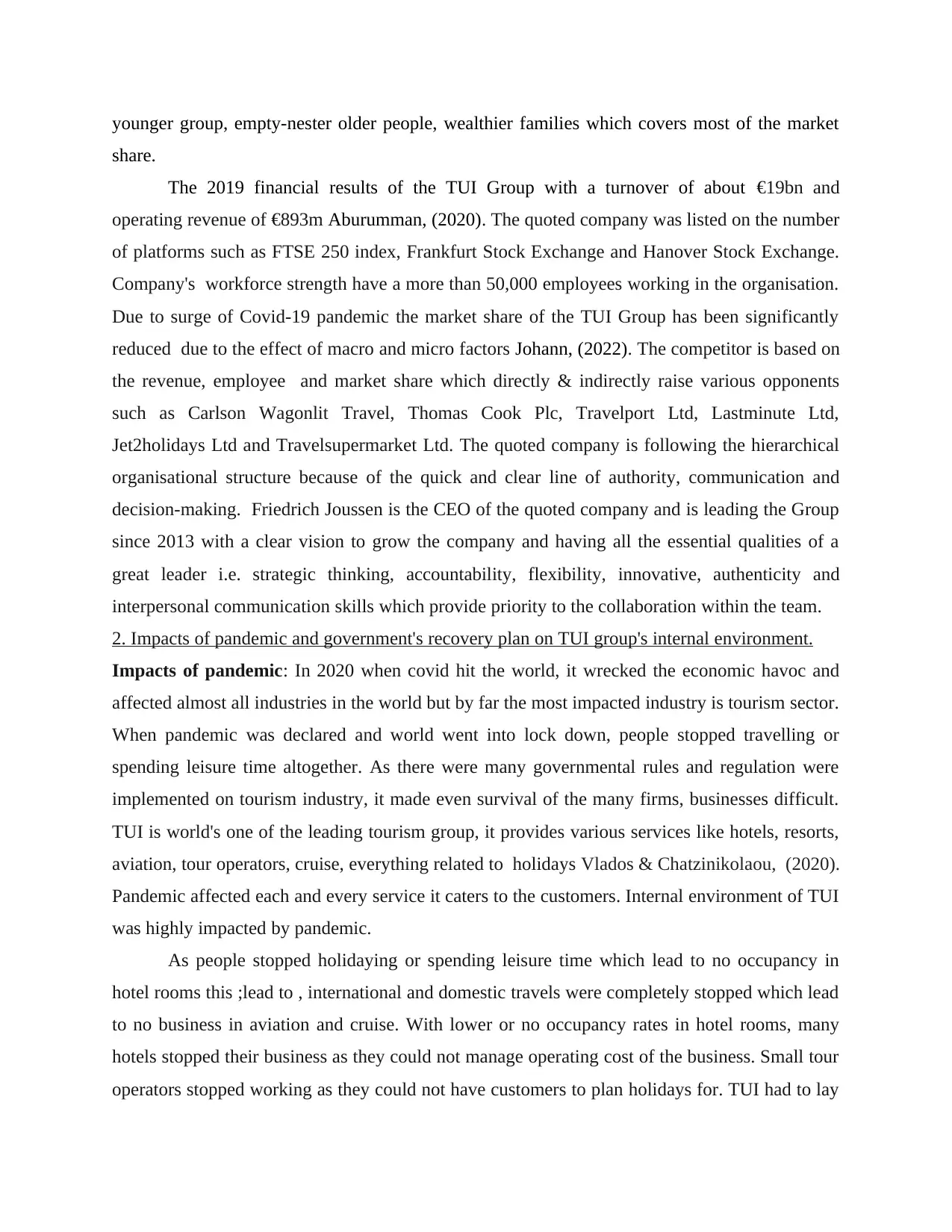
younger group, empty-nester older people, wealthier families which covers most of the market
share.
The 2019 financial results of the TUI Group with a turnover of about €19bn and
operating revenue of €893m Aburumman, (2020). The quoted company was listed on the number
of platforms such as FTSE 250 index, Frankfurt Stock Exchange and Hanover Stock Exchange.
Company's workforce strength have a more than 50,000 employees working in the organisation.
Due to surge of Covid-19 pandemic the market share of the TUI Group has been significantly
reduced due to the effect of macro and micro factors Johann, (2022). The competitor is based on
the revenue, employee and market share which directly & indirectly raise various opponents
such as Carlson Wagonlit Travel, Thomas Cook Plc, Travelport Ltd, Lastminute Ltd,
Jet2holidays Ltd and Travelsupermarket Ltd. The quoted company is following the hierarchical
organisational structure because of the quick and clear line of authority, communication and
decision-making. Friedrich Joussen is the CEO of the quoted company and is leading the Group
since 2013 with a clear vision to grow the company and having all the essential qualities of a
great leader i.e. strategic thinking, accountability, flexibility, innovative, authenticity and
interpersonal communication skills which provide priority to the collaboration within the team.
2. Impacts of pandemic and government's recovery plan on TUI group's internal environment.
Impacts of pandemic: In 2020 when covid hit the world, it wrecked the economic havoc and
affected almost all industries in the world but by far the most impacted industry is tourism sector.
When pandemic was declared and world went into lock down, people stopped travelling or
spending leisure time altogether. As there were many governmental rules and regulation were
implemented on tourism industry, it made even survival of the many firms, businesses difficult.
TUI is world's one of the leading tourism group, it provides various services like hotels, resorts,
aviation, tour operators, cruise, everything related to holidays Vlados & Chatzinikolaou, (2020).
Pandemic affected each and every service it caters to the customers. Internal environment of TUI
was highly impacted by pandemic.
As people stopped holidaying or spending leisure time which lead to no occupancy in
hotel rooms this ;lead to , international and domestic travels were completely stopped which lead
to no business in aviation and cruise. With lower or no occupancy rates in hotel rooms, many
hotels stopped their business as they could not manage operating cost of the business. Small tour
operators stopped working as they could not have customers to plan holidays for. TUI had to lay
share.
The 2019 financial results of the TUI Group with a turnover of about €19bn and
operating revenue of €893m Aburumman, (2020). The quoted company was listed on the number
of platforms such as FTSE 250 index, Frankfurt Stock Exchange and Hanover Stock Exchange.
Company's workforce strength have a more than 50,000 employees working in the organisation.
Due to surge of Covid-19 pandemic the market share of the TUI Group has been significantly
reduced due to the effect of macro and micro factors Johann, (2022). The competitor is based on
the revenue, employee and market share which directly & indirectly raise various opponents
such as Carlson Wagonlit Travel, Thomas Cook Plc, Travelport Ltd, Lastminute Ltd,
Jet2holidays Ltd and Travelsupermarket Ltd. The quoted company is following the hierarchical
organisational structure because of the quick and clear line of authority, communication and
decision-making. Friedrich Joussen is the CEO of the quoted company and is leading the Group
since 2013 with a clear vision to grow the company and having all the essential qualities of a
great leader i.e. strategic thinking, accountability, flexibility, innovative, authenticity and
interpersonal communication skills which provide priority to the collaboration within the team.
2. Impacts of pandemic and government's recovery plan on TUI group's internal environment.
Impacts of pandemic: In 2020 when covid hit the world, it wrecked the economic havoc and
affected almost all industries in the world but by far the most impacted industry is tourism sector.
When pandemic was declared and world went into lock down, people stopped travelling or
spending leisure time altogether. As there were many governmental rules and regulation were
implemented on tourism industry, it made even survival of the many firms, businesses difficult.
TUI is world's one of the leading tourism group, it provides various services like hotels, resorts,
aviation, tour operators, cruise, everything related to holidays Vlados & Chatzinikolaou, (2020).
Pandemic affected each and every service it caters to the customers. Internal environment of TUI
was highly impacted by pandemic.
As people stopped holidaying or spending leisure time which lead to no occupancy in
hotel rooms this ;lead to , international and domestic travels were completely stopped which lead
to no business in aviation and cruise. With lower or no occupancy rates in hotel rooms, many
hotels stopped their business as they could not manage operating cost of the business. Small tour
operators stopped working as they could not have customers to plan holidays for. TUI had to lay
Paraphrase This Document
Need a fresh take? Get an instant paraphrase of this document with our AI Paraphraser
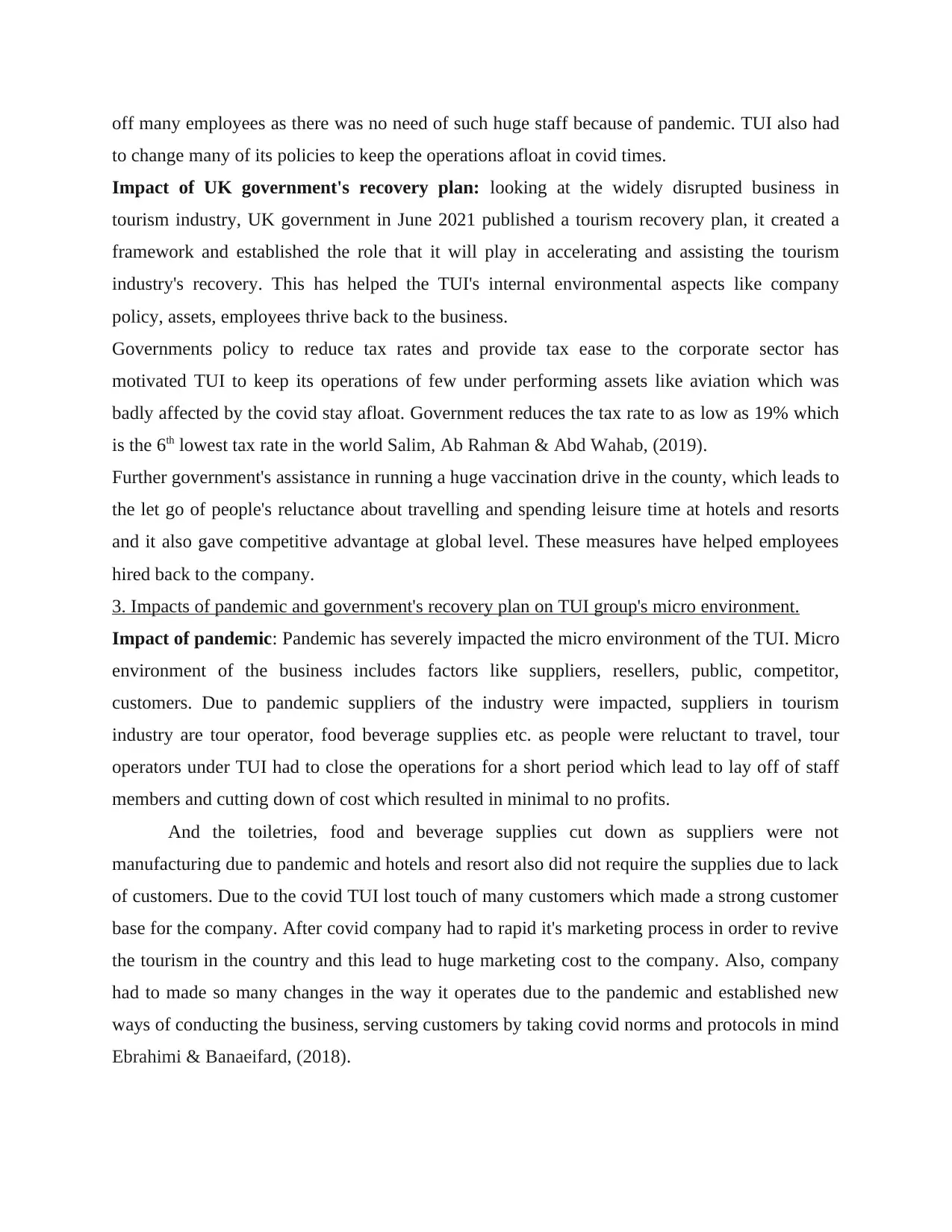
off many employees as there was no need of such huge staff because of pandemic. TUI also had
to change many of its policies to keep the operations afloat in covid times.
Impact of UK government's recovery plan: looking at the widely disrupted business in
tourism industry, UK government in June 2021 published a tourism recovery plan, it created a
framework and established the role that it will play in accelerating and assisting the tourism
industry's recovery. This has helped the TUI's internal environmental aspects like company
policy, assets, employees thrive back to the business.
Governments policy to reduce tax rates and provide tax ease to the corporate sector has
motivated TUI to keep its operations of few under performing assets like aviation which was
badly affected by the covid stay afloat. Government reduces the tax rate to as low as 19% which
is the 6th lowest tax rate in the world Salim, Ab Rahman & Abd Wahab, (2019).
Further government's assistance in running a huge vaccination drive in the county, which leads to
the let go of people's reluctance about travelling and spending leisure time at hotels and resorts
and it also gave competitive advantage at global level. These measures have helped employees
hired back to the company.
3. Impacts of pandemic and government's recovery plan on TUI group's micro environment.
Impact of pandemic: Pandemic has severely impacted the micro environment of the TUI. Micro
environment of the business includes factors like suppliers, resellers, public, competitor,
customers. Due to pandemic suppliers of the industry were impacted, suppliers in tourism
industry are tour operator, food beverage supplies etc. as people were reluctant to travel, tour
operators under TUI had to close the operations for a short period which lead to lay off of staff
members and cutting down of cost which resulted in minimal to no profits.
And the toiletries, food and beverage supplies cut down as suppliers were not
manufacturing due to pandemic and hotels and resort also did not require the supplies due to lack
of customers. Due to the covid TUI lost touch of many customers which made a strong customer
base for the company. After covid company had to rapid it's marketing process in order to revive
the tourism in the country and this lead to huge marketing cost to the company. Also, company
had to made so many changes in the way it operates due to the pandemic and established new
ways of conducting the business, serving customers by taking covid norms and protocols in mind
Ebrahimi & Banaeifard, (2018).
to change many of its policies to keep the operations afloat in covid times.
Impact of UK government's recovery plan: looking at the widely disrupted business in
tourism industry, UK government in June 2021 published a tourism recovery plan, it created a
framework and established the role that it will play in accelerating and assisting the tourism
industry's recovery. This has helped the TUI's internal environmental aspects like company
policy, assets, employees thrive back to the business.
Governments policy to reduce tax rates and provide tax ease to the corporate sector has
motivated TUI to keep its operations of few under performing assets like aviation which was
badly affected by the covid stay afloat. Government reduces the tax rate to as low as 19% which
is the 6th lowest tax rate in the world Salim, Ab Rahman & Abd Wahab, (2019).
Further government's assistance in running a huge vaccination drive in the county, which leads to
the let go of people's reluctance about travelling and spending leisure time at hotels and resorts
and it also gave competitive advantage at global level. These measures have helped employees
hired back to the company.
3. Impacts of pandemic and government's recovery plan on TUI group's micro environment.
Impact of pandemic: Pandemic has severely impacted the micro environment of the TUI. Micro
environment of the business includes factors like suppliers, resellers, public, competitor,
customers. Due to pandemic suppliers of the industry were impacted, suppliers in tourism
industry are tour operator, food beverage supplies etc. as people were reluctant to travel, tour
operators under TUI had to close the operations for a short period which lead to lay off of staff
members and cutting down of cost which resulted in minimal to no profits.
And the toiletries, food and beverage supplies cut down as suppliers were not
manufacturing due to pandemic and hotels and resort also did not require the supplies due to lack
of customers. Due to the covid TUI lost touch of many customers which made a strong customer
base for the company. After covid company had to rapid it's marketing process in order to revive
the tourism in the country and this lead to huge marketing cost to the company. Also, company
had to made so many changes in the way it operates due to the pandemic and established new
ways of conducting the business, serving customers by taking covid norms and protocols in mind
Ebrahimi & Banaeifard, (2018).
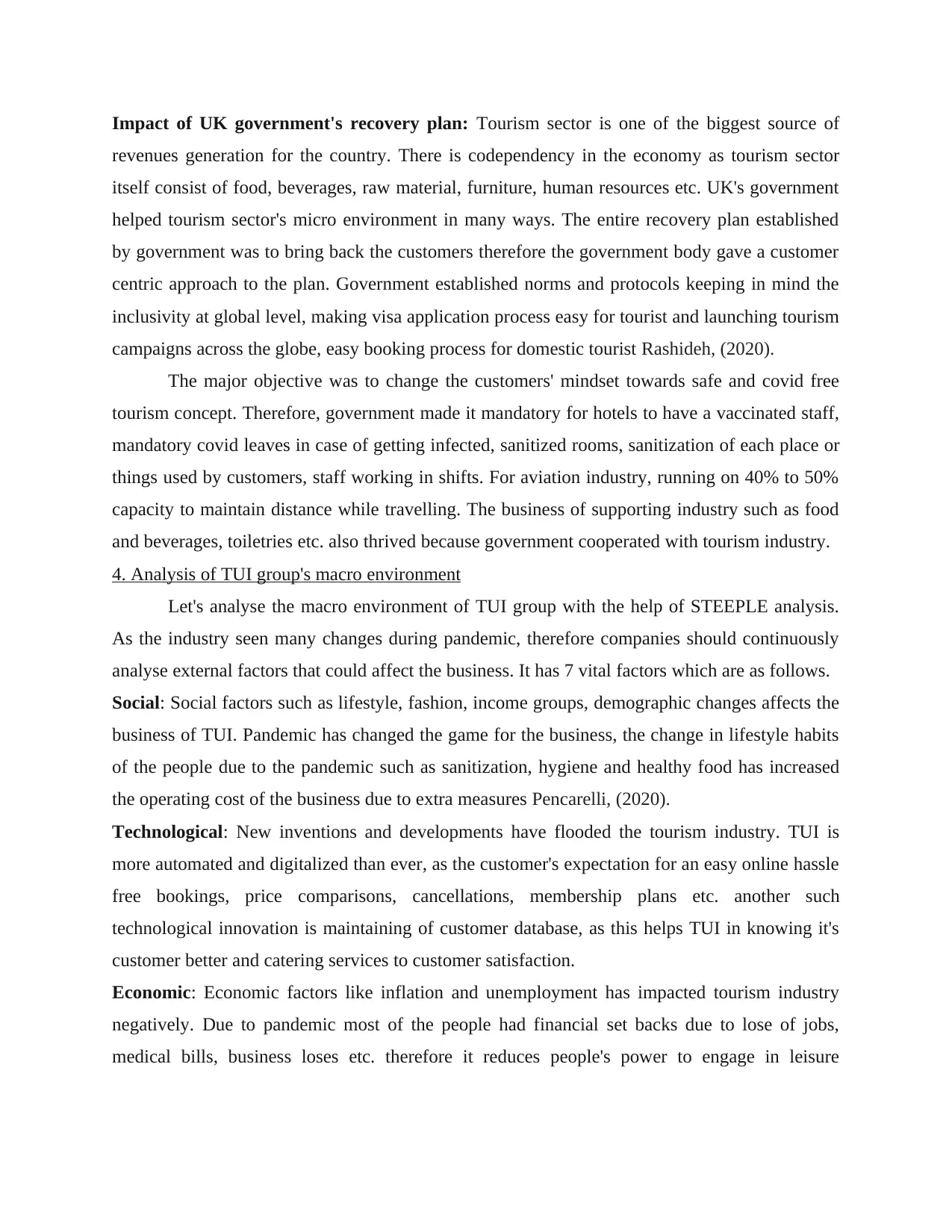
Impact of UK government's recovery plan: Tourism sector is one of the biggest source of
revenues generation for the country. There is codependency in the economy as tourism sector
itself consist of food, beverages, raw material, furniture, human resources etc. UK's government
helped tourism sector's micro environment in many ways. The entire recovery plan established
by government was to bring back the customers therefore the government body gave a customer
centric approach to the plan. Government established norms and protocols keeping in mind the
inclusivity at global level, making visa application process easy for tourist and launching tourism
campaigns across the globe, easy booking process for domestic tourist Rashideh, (2020).
The major objective was to change the customers' mindset towards safe and covid free
tourism concept. Therefore, government made it mandatory for hotels to have a vaccinated staff,
mandatory covid leaves in case of getting infected, sanitized rooms, sanitization of each place or
things used by customers, staff working in shifts. For aviation industry, running on 40% to 50%
capacity to maintain distance while travelling. The business of supporting industry such as food
and beverages, toiletries etc. also thrived because government cooperated with tourism industry.
4. Analysis of TUI group's macro environment
Let's analyse the macro environment of TUI group with the help of STEEPLE analysis.
As the industry seen many changes during pandemic, therefore companies should continuously
analyse external factors that could affect the business. It has 7 vital factors which are as follows.
Social: Social factors such as lifestyle, fashion, income groups, demographic changes affects the
business of TUI. Pandemic has changed the game for the business, the change in lifestyle habits
of the people due to the pandemic such as sanitization, hygiene and healthy food has increased
the operating cost of the business due to extra measures Pencarelli, (2020).
Technological: New inventions and developments have flooded the tourism industry. TUI is
more automated and digitalized than ever, as the customer's expectation for an easy online hassle
free bookings, price comparisons, cancellations, membership plans etc. another such
technological innovation is maintaining of customer database, as this helps TUI in knowing it's
customer better and catering services to customer satisfaction.
Economic: Economic factors like inflation and unemployment has impacted tourism industry
negatively. Due to pandemic most of the people had financial set backs due to lose of jobs,
medical bills, business loses etc. therefore it reduces people's power to engage in leisure
revenues generation for the country. There is codependency in the economy as tourism sector
itself consist of food, beverages, raw material, furniture, human resources etc. UK's government
helped tourism sector's micro environment in many ways. The entire recovery plan established
by government was to bring back the customers therefore the government body gave a customer
centric approach to the plan. Government established norms and protocols keeping in mind the
inclusivity at global level, making visa application process easy for tourist and launching tourism
campaigns across the globe, easy booking process for domestic tourist Rashideh, (2020).
The major objective was to change the customers' mindset towards safe and covid free
tourism concept. Therefore, government made it mandatory for hotels to have a vaccinated staff,
mandatory covid leaves in case of getting infected, sanitized rooms, sanitization of each place or
things used by customers, staff working in shifts. For aviation industry, running on 40% to 50%
capacity to maintain distance while travelling. The business of supporting industry such as food
and beverages, toiletries etc. also thrived because government cooperated with tourism industry.
4. Analysis of TUI group's macro environment
Let's analyse the macro environment of TUI group with the help of STEEPLE analysis.
As the industry seen many changes during pandemic, therefore companies should continuously
analyse external factors that could affect the business. It has 7 vital factors which are as follows.
Social: Social factors such as lifestyle, fashion, income groups, demographic changes affects the
business of TUI. Pandemic has changed the game for the business, the change in lifestyle habits
of the people due to the pandemic such as sanitization, hygiene and healthy food has increased
the operating cost of the business due to extra measures Pencarelli, (2020).
Technological: New inventions and developments have flooded the tourism industry. TUI is
more automated and digitalized than ever, as the customer's expectation for an easy online hassle
free bookings, price comparisons, cancellations, membership plans etc. another such
technological innovation is maintaining of customer database, as this helps TUI in knowing it's
customer better and catering services to customer satisfaction.
Economic: Economic factors like inflation and unemployment has impacted tourism industry
negatively. Due to pandemic most of the people had financial set backs due to lose of jobs,
medical bills, business loses etc. therefore it reduces people's power to engage in leisure
⊘ This is a preview!⊘
Do you want full access?
Subscribe today to unlock all pages.

Trusted by 1+ million students worldwide
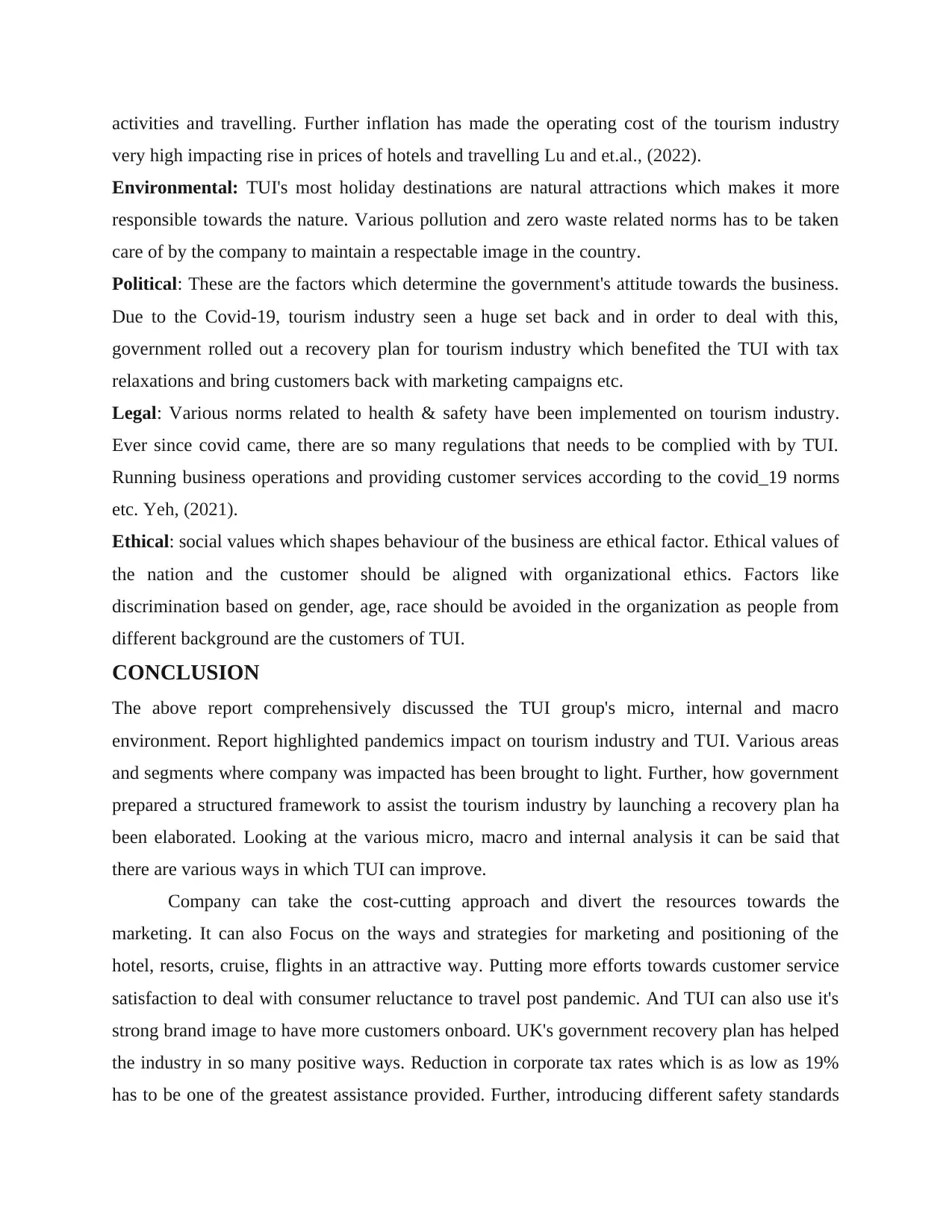
activities and travelling. Further inflation has made the operating cost of the tourism industry
very high impacting rise in prices of hotels and travelling Lu and et.al., (2022).
Environmental: TUI's most holiday destinations are natural attractions which makes it more
responsible towards the nature. Various pollution and zero waste related norms has to be taken
care of by the company to maintain a respectable image in the country.
Political: These are the factors which determine the government's attitude towards the business.
Due to the Covid-19, tourism industry seen a huge set back and in order to deal with this,
government rolled out a recovery plan for tourism industry which benefited the TUI with tax
relaxations and bring customers back with marketing campaigns etc.
Legal: Various norms related to health & safety have been implemented on tourism industry.
Ever since covid came, there are so many regulations that needs to be complied with by TUI.
Running business operations and providing customer services according to the covid_19 norms
etc. Yeh, (2021).
Ethical: social values which shapes behaviour of the business are ethical factor. Ethical values of
the nation and the customer should be aligned with organizational ethics. Factors like
discrimination based on gender, age, race should be avoided in the organization as people from
different background are the customers of TUI.
CONCLUSION
The above report comprehensively discussed the TUI group's micro, internal and macro
environment. Report highlighted pandemics impact on tourism industry and TUI. Various areas
and segments where company was impacted has been brought to light. Further, how government
prepared a structured framework to assist the tourism industry by launching a recovery plan ha
been elaborated. Looking at the various micro, macro and internal analysis it can be said that
there are various ways in which TUI can improve.
Company can take the cost-cutting approach and divert the resources towards the
marketing. It can also Focus on the ways and strategies for marketing and positioning of the
hotel, resorts, cruise, flights in an attractive way. Putting more efforts towards customer service
satisfaction to deal with consumer reluctance to travel post pandemic. And TUI can also use it's
strong brand image to have more customers onboard. UK's government recovery plan has helped
the industry in so many positive ways. Reduction in corporate tax rates which is as low as 19%
has to be one of the greatest assistance provided. Further, introducing different safety standards
very high impacting rise in prices of hotels and travelling Lu and et.al., (2022).
Environmental: TUI's most holiday destinations are natural attractions which makes it more
responsible towards the nature. Various pollution and zero waste related norms has to be taken
care of by the company to maintain a respectable image in the country.
Political: These are the factors which determine the government's attitude towards the business.
Due to the Covid-19, tourism industry seen a huge set back and in order to deal with this,
government rolled out a recovery plan for tourism industry which benefited the TUI with tax
relaxations and bring customers back with marketing campaigns etc.
Legal: Various norms related to health & safety have been implemented on tourism industry.
Ever since covid came, there are so many regulations that needs to be complied with by TUI.
Running business operations and providing customer services according to the covid_19 norms
etc. Yeh, (2021).
Ethical: social values which shapes behaviour of the business are ethical factor. Ethical values of
the nation and the customer should be aligned with organizational ethics. Factors like
discrimination based on gender, age, race should be avoided in the organization as people from
different background are the customers of TUI.
CONCLUSION
The above report comprehensively discussed the TUI group's micro, internal and macro
environment. Report highlighted pandemics impact on tourism industry and TUI. Various areas
and segments where company was impacted has been brought to light. Further, how government
prepared a structured framework to assist the tourism industry by launching a recovery plan ha
been elaborated. Looking at the various micro, macro and internal analysis it can be said that
there are various ways in which TUI can improve.
Company can take the cost-cutting approach and divert the resources towards the
marketing. It can also Focus on the ways and strategies for marketing and positioning of the
hotel, resorts, cruise, flights in an attractive way. Putting more efforts towards customer service
satisfaction to deal with consumer reluctance to travel post pandemic. And TUI can also use it's
strong brand image to have more customers onboard. UK's government recovery plan has helped
the industry in so many positive ways. Reduction in corporate tax rates which is as low as 19%
has to be one of the greatest assistance provided. Further, introducing different safety standards
Paraphrase This Document
Need a fresh take? Get an instant paraphrase of this document with our AI Paraphraser
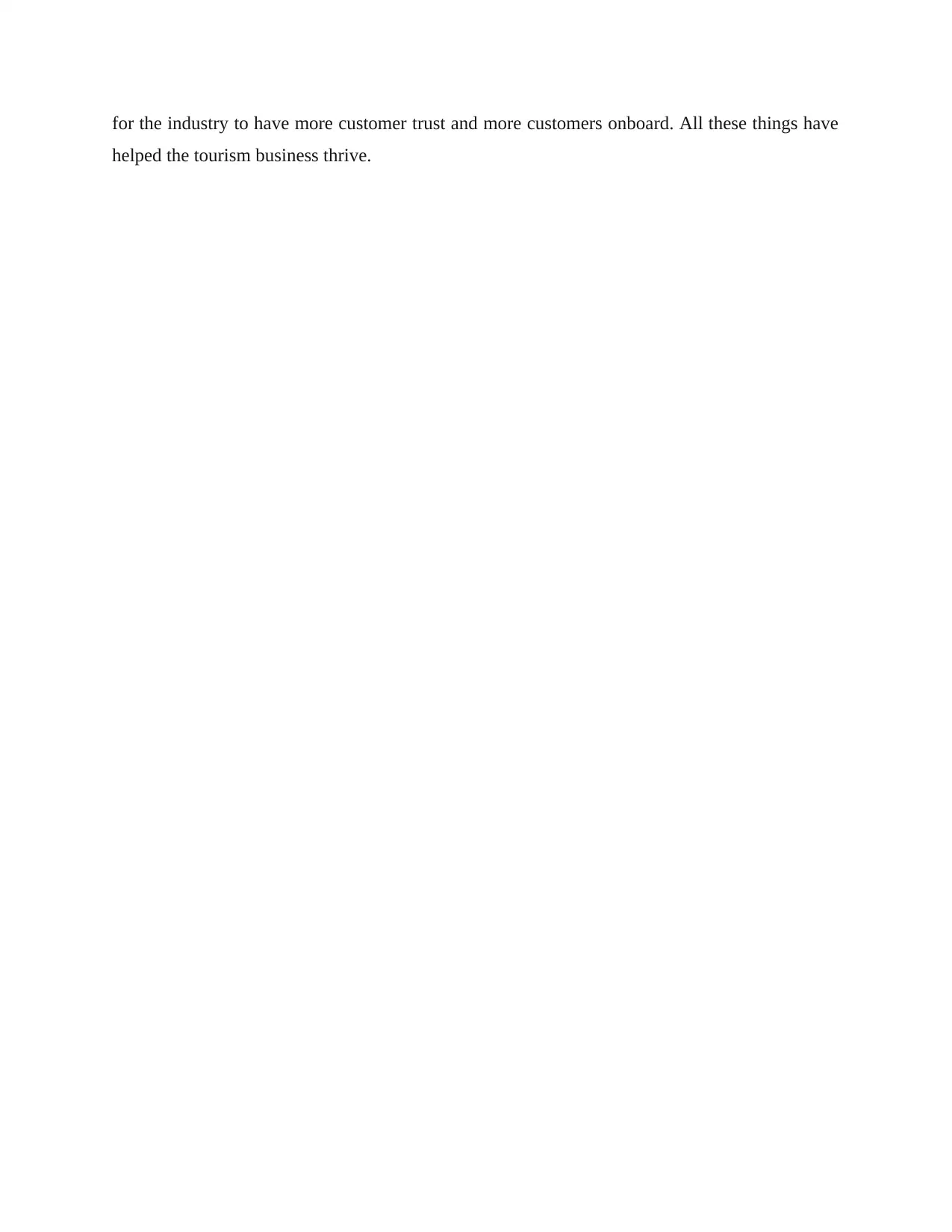
for the industry to have more customer trust and more customers onboard. All these things have
helped the tourism business thrive.
helped the tourism business thrive.
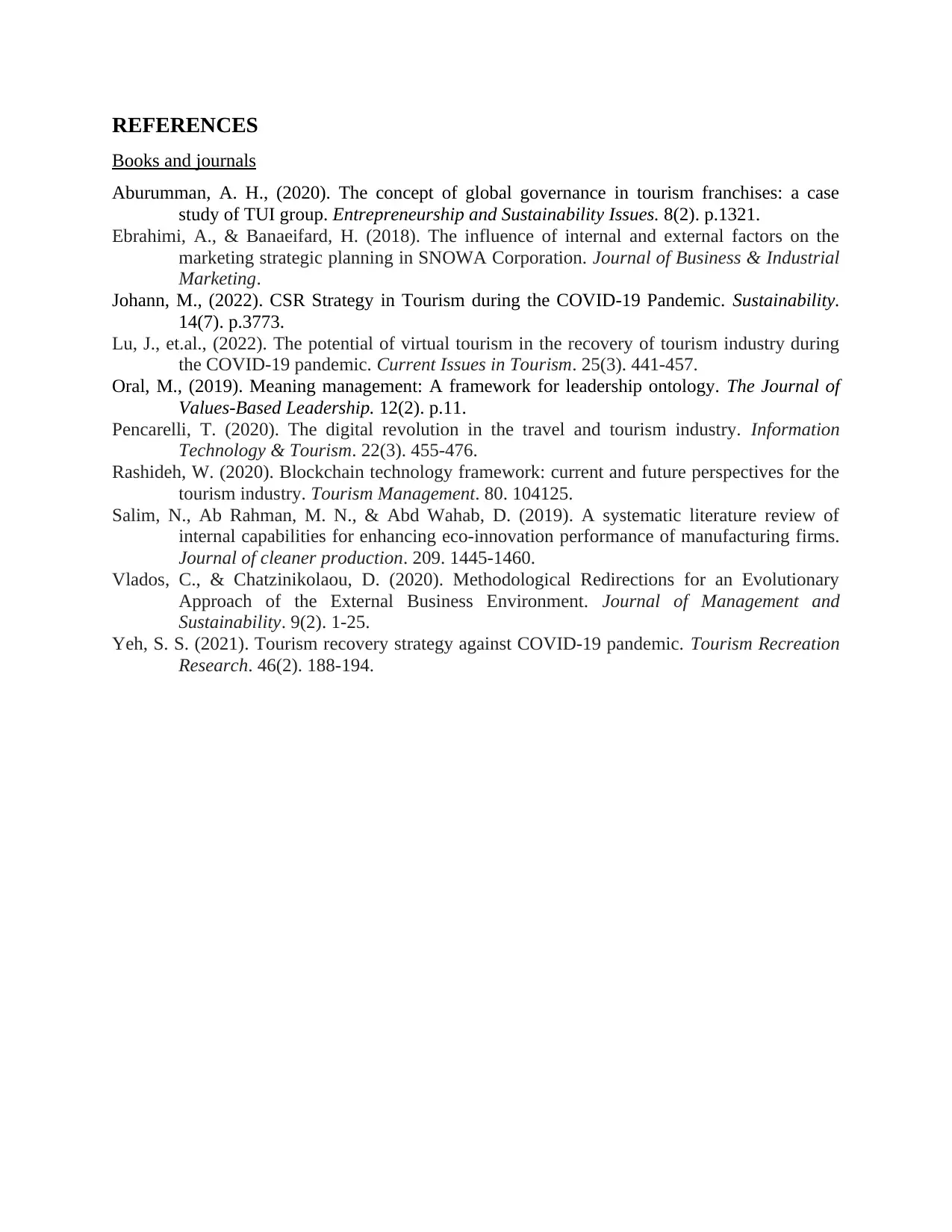
REFERENCES
Books and journals
Aburumman, A. H., (2020). The concept of global governance in tourism franchises: a case
study of TUI group. Entrepreneurship and Sustainability Issues. 8(2). p.1321.
Ebrahimi, A., & Banaeifard, H. (2018). The influence of internal and external factors on the
marketing strategic planning in SNOWA Corporation. Journal of Business & Industrial
Marketing.
Johann, M., (2022). CSR Strategy in Tourism during the COVID-19 Pandemic. Sustainability.
14(7). p.3773.
Lu, J., et.al., (2022). The potential of virtual tourism in the recovery of tourism industry during
the COVID-19 pandemic. Current Issues in Tourism. 25(3). 441-457.
Oral, M., (2019). Meaning management: A framework for leadership ontology. The Journal of
Values-Based Leadership. 12(2). p.11.
Pencarelli, T. (2020). The digital revolution in the travel and tourism industry. Information
Technology & Tourism. 22(3). 455-476.
Rashideh, W. (2020). Blockchain technology framework: current and future perspectives for the
tourism industry. Tourism Management. 80. 104125.
Salim, N., Ab Rahman, M. N., & Abd Wahab, D. (2019). A systematic literature review of
internal capabilities for enhancing eco-innovation performance of manufacturing firms.
Journal of cleaner production. 209. 1445-1460.
Vlados, C., & Chatzinikolaou, D. (2020). Methodological Redirections for an Evolutionary
Approach of the External Business Environment. Journal of Management and
Sustainability. 9(2). 1-25.
Yeh, S. S. (2021). Tourism recovery strategy against COVID-19 pandemic. Tourism Recreation
Research. 46(2). 188-194.
Books and journals
Aburumman, A. H., (2020). The concept of global governance in tourism franchises: a case
study of TUI group. Entrepreneurship and Sustainability Issues. 8(2). p.1321.
Ebrahimi, A., & Banaeifard, H. (2018). The influence of internal and external factors on the
marketing strategic planning in SNOWA Corporation. Journal of Business & Industrial
Marketing.
Johann, M., (2022). CSR Strategy in Tourism during the COVID-19 Pandemic. Sustainability.
14(7). p.3773.
Lu, J., et.al., (2022). The potential of virtual tourism in the recovery of tourism industry during
the COVID-19 pandemic. Current Issues in Tourism. 25(3). 441-457.
Oral, M., (2019). Meaning management: A framework for leadership ontology. The Journal of
Values-Based Leadership. 12(2). p.11.
Pencarelli, T. (2020). The digital revolution in the travel and tourism industry. Information
Technology & Tourism. 22(3). 455-476.
Rashideh, W. (2020). Blockchain technology framework: current and future perspectives for the
tourism industry. Tourism Management. 80. 104125.
Salim, N., Ab Rahman, M. N., & Abd Wahab, D. (2019). A systematic literature review of
internal capabilities for enhancing eco-innovation performance of manufacturing firms.
Journal of cleaner production. 209. 1445-1460.
Vlados, C., & Chatzinikolaou, D. (2020). Methodological Redirections for an Evolutionary
Approach of the External Business Environment. Journal of Management and
Sustainability. 9(2). 1-25.
Yeh, S. S. (2021). Tourism recovery strategy against COVID-19 pandemic. Tourism Recreation
Research. 46(2). 188-194.
⊘ This is a preview!⊘
Do you want full access?
Subscribe today to unlock all pages.

Trusted by 1+ million students worldwide
1 out of 9
Related Documents
Your All-in-One AI-Powered Toolkit for Academic Success.
+13062052269
info@desklib.com
Available 24*7 on WhatsApp / Email
![[object Object]](/_next/static/media/star-bottom.7253800d.svg)
Unlock your academic potential
Copyright © 2020–2026 A2Z Services. All Rights Reserved. Developed and managed by ZUCOL.



